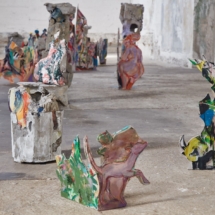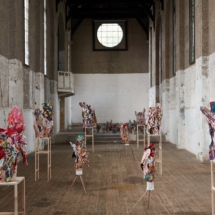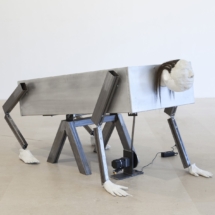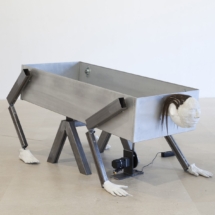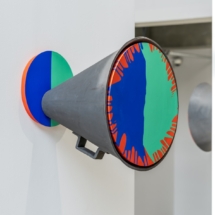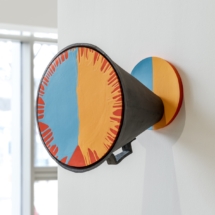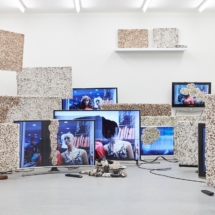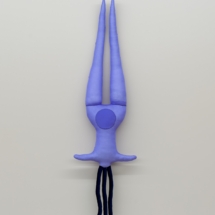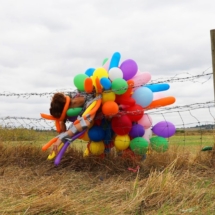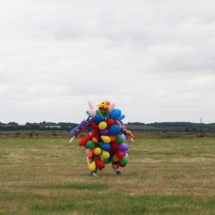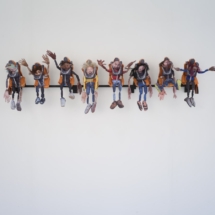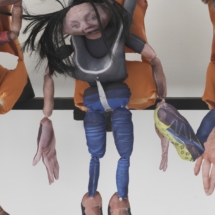Poor Things is an exhibition that has come out of conversations about art and social class. Conversations that artists Emma Hart and Dean Kenning have had together as friends, and with the Fruitmarket, a free public space for art. The exhibition features artists : Linda Aloysius, Eric Bainbridge, Jonathan Baldock, Simeon Barclay, Joseph Buckley, Beagles and Ramsay, Chila Burman, Andrew Cooper, Jamie Cooper, Penny Goring, Brian Griffiths, Emma Hart, Lee Holden, Dean Kenning, Josie KO, Rosie McGinn, Rebecca Moss, Janette Parris, Anne Ryan, Aled Simons, Laura Yuile. It is hoped the exhibition will ignite conversations about class through sculpture.
Class is a social relation of power defined by inequality and exploitation. Following Bourdieu, both Hart and Kenning understand class and the reproduction of class hierarchies not only in terms of economic capital, but social and cultural capital: artists from lower class backgrounds may be ‘poor’ not only in terms of money, but also time, space, know-how, confidence, availability and contacts. At the same time, class speaks positively to values, experiences, traditions, pleasures, attitudes and identities which can crash with a richness and appeal into the often staid and exclusionary realms of ‘high art’ in shapes which are, in equal measure, painful, poignant, joyous, strange and true.
In order to explore these matters, Hart and Kenning have brought together what they consider to be some of the best ‘poor things’ made by contemporary UK based artists. And, in a spirit of solidarity and good times, they will engage in a series of conversations with each of the artists in front of their sculptures and fire up the opportunity to talk directly about sculpture through the lens of class, and class through the lens of sculpture. By pursuing dialogues about class through a focus on the work, they hope to provoke reflection and new thoughts, combining both the subjective and the objective realities of class, avoiding both an overly individualized approach which begins with personal biography, and an overly sociological approach which begins with classification and statistics.
These conversations will form a central plank of Poor Things, as it is hoped they will reveal a multiplicity of experiences of artists whose work speaks to working and lower-middle class backgrounds, whilst identifying points of commonality. Audio recordings of these conversations will be available to access by visitors to the exhibition as they move from artwork to artwork, and will be collated for a publication to be launched during the exhibition.
When talking together in front of our work we’ve come to recognise that often the decisions that manifest in our sculptures around subject matter, materials and methods harbour questions about social class. For example, we both often relinquish aesthetic control, as we prioritise what the work does rather than how it looks. We have discovered that we both interpret this focus on doing as stemming from an anxiety about the nature of aesthetic composition, both associating it with middle class traits of privilege, control, the luxury of time on your hands and tasteful decor. We want to think of our own sculptures not as a careful arrangement of colours, textures and forms, but as machines or present tense things that are full of life – things which can speak to us about our world and leave a dent in someone else’s, generating in the mind of the viewer something more than aesthetic appreciation. We are hoping for reactions like joy, pity, laughter or embarrassment which are importantly not dependent on the audience having a great knowledge of art. There are other strategies within our work that we think could be triggers for a discussion around class. These include manual production, liveness, entertainment, the use of everyday objects and materials, dumb humour, and a popular visual graphic vocabulary of figures and gestures. We are not saying that these are fixed markers of identity, or labels of exclusively ‘working class’ ways of working, but that the decisions we make have the potential to ignite discussions about class.
Further to that, we believe that sculpture itself in its thingness – the way it occupies the same ground as the viewer and often makes use of ordinary stuff – and its relation both to manual construction and common forms of making and craft, offers a particularly powerful means by which to question how class impacts on and is expressed through artistic practice. This leads us to wonder: how do other artists’ sculptures speak to and broaden class experiences and understandings? Also, how do class factors intersect with questions of race, gender and sexuality which might be manifested in artists’ works? We approach the exhibition not with fixed ideas about how each work addresses class, but as a way of finding things out and hopefully, in this way, broadening the conversation around art and class. ~ Emma Hart and Dean Kenning
Poor Things
An exhibition of sculpture in the context of class
Brought together by artists Emma Hart and Dean Kenning
04.03.23 – 21.05.23
Exhibition Galleries
Fruitmarket, 45 Market St, Edinburgh











